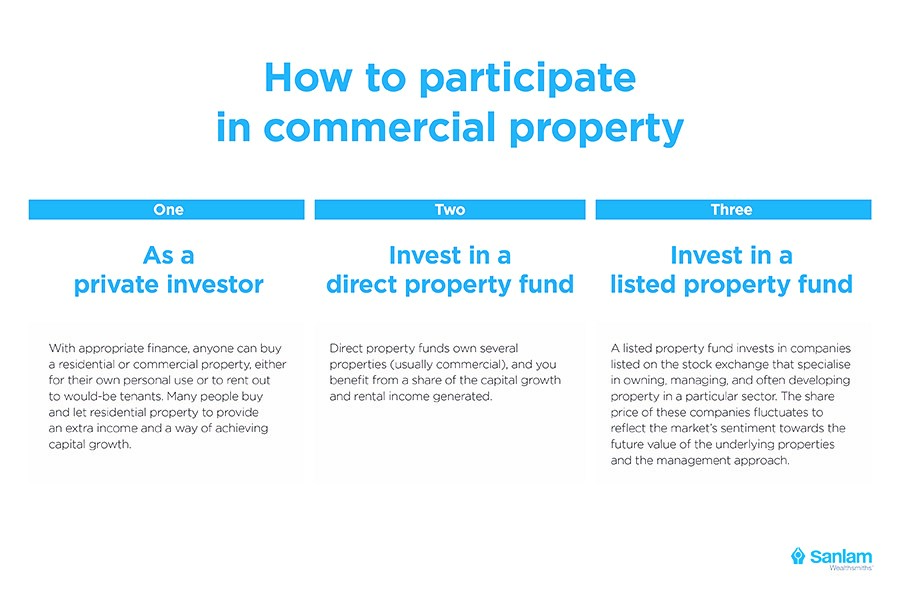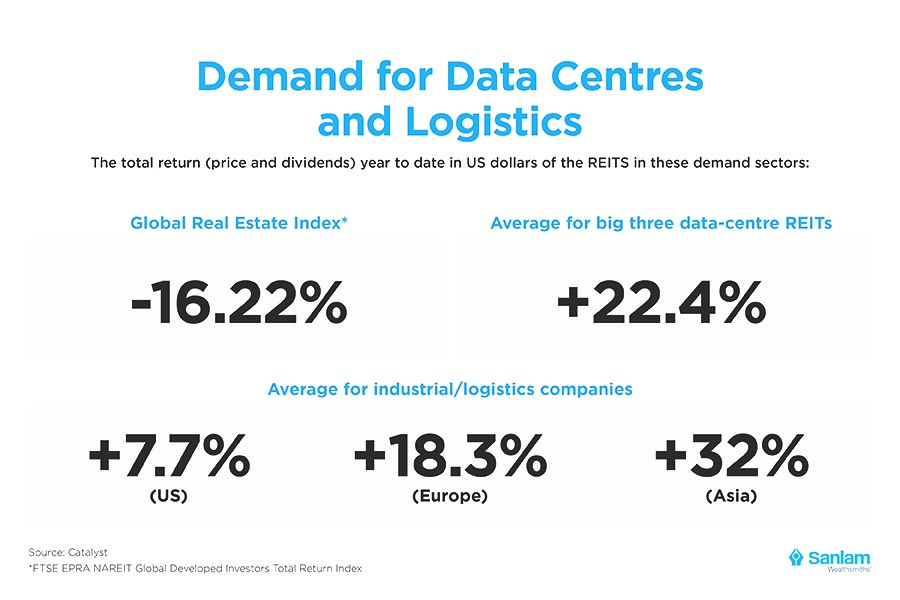We love property in the UK. There’s something about investing in an asset you can see and touch that gives us a sense of security. Like any other asset class, though, the value of property has its ups and downs, and it can be negatively affected by an economic crisis. Most diversified portfolios will have some exposure to commercial property, but with Covid-19 causing landlords of offices and shopping outlets to endure unpaid rent, and a great deal of uncertainty around future demand, should this be under review?
Should I reduce my exposure to commercial property?
When you think about it, commercial property underpins the entire economy in one way or another. Whether it’s an office, a distribution warehouse, data centre, university, hospital or even a cell-phone tower, almost every business in the world relies on some form of building or infrastructure.

As with any other asset class, investing in commercial property is all about timing. Because it transcends every business sector across the world, there will always be winners and losers at any given point in time. For example, retail outlets and city-centre offices are currently experiencing a dramatic downturn thanks to Covid-19, and the future looks increasingly uncertain. According to a report in the Financial Times,[i] by 24 June this year, retailers had paid just 14 per cent of their quarterly rent, leaving landlords waiting for £2.15bn in unpaid rent. And according to Bloomberg,[ii] offices in London are set to decline in value by up to 10% this year, underlined by large companies such as JP Morgan and Linklaters publicly urging employees to work from home indefinitely.
But while these sectors have been badly hit, online shopping and the accelerated adoption of platforms such as Microsoft Teams and Zoom have meant growth in other parts of the sector. Take data centres for example. Big tech companies were earning around $10 billion per quarter revenue from their cloud businesses. In the second quarter of 2020, this grew to approximately $27 billion,[iii] which has led to increased demand for data-centre warehouse space. In 2015, the big three data-centre providers leased around 630,000 square feet per quarter. This increased to a record 1,600 square feet in the second quarter of 2020 – almost double the previous quarter.[iv]
At the same time, online sales have grown approximately 30% this year, which has led to a massive increase in demand for warehouse space, with Amazon being the biggest driver. In 2010, demand for warehouse space was around 6 million square foot. This has shot up to 57 million square feet year to date and is showing no sign of abating.[v]
So, to tar the whole of the commercial property sector with the same brush would be to miss an opportunity. We just need to be able to maximise and minimise our exposure in the right place, at the right time.
Alternative ways to invest in commercial property
One of the biggest attractions of investing in commercial property is that it offers investors the potential for capital growth, as well as a source of income in the form of rent. But that upside brings with it a lack of liquidity (meaning it can take a long time to access your money), and this is never more apparent than amid a global economic crisis. Anyone invested directly in property, or a direct property fund, may well have found their money trapped and falling in value thanks to the Covid-19 crisis. The value of property, after all, depends on how much someone is willing to pay for it – if, indeed, anyone is willing to pay for it at all.
An alternative to the direct approach is to invest in a listed property fund, such as a real estate investment trust (REIT). These funds differ from direct property funds because they invest in companies that own and manage properties, as opposed to the properties themselves. The share price of REITs fluctuates to reflect the market sentiment towards the future value of the underlying properties rather than the actual value, whereas direct fund valuations are backward-looking based on recent transactions (which have been almost non-existent recently).

The benefits of investing in listed property funds
-
Liquidity
Listed property companies enjoy greater liquidity (see above) than direct property funds, since you are buying a share of the company rather than a share in the underlying properties. Shares in these companies trade on large public exchanges, such as the London Stock Exchange. That does mean investors might experience volatility in the short term, but for many, this is an acceptable price to pay for daily liquidity.
-
Diversification
Listed property funds enable investment across different business sectors and geographies. If one sector or country is experiencing a downturn, investors can easily change focus or take advantage of that downturn if they foresee a future recovery. They can also easily sell holdings deemed to be excessively priced.
-
Companies enjoy high barriers to entry
The value of these companies depends on more than just the buildings they own. Their managements are experts in their sector, with years of knowledge and experience – as well as strong relationships with potential tenants – that are difficult to replicate. They understand where they can add value to their portfolios and when is the right time to sell to maximise that value.
-
Rental income provides regular income
Ultimately, the value of the company will depend on the rental income it generates, which it can then pass on to shareholders in the form of a dividend. Investors care deeply about the security of this income and whether it has the capacity to rise with inflation. With bond yields so low, this offers a good alternative for clients seeking income generation, as it is underpinned by long lease contracts.
-
Gives investors access to niche sectors
These companies give investors access to property sectors that may not be accessible through a private, direct fund. Such niche sectors include data centres, lab space, healthcare facilities, manufactured housing and cell-phone towers.
-
Corporate governance
Listed property companies are subject to strict standards of corporate governance, financial reporting and information disclosure, as required by public-exchange listing rules. Investors benefit from these securities regulations and from having a board overseeing the management on their behalf.
The Sanlam approach
While times might be tough for some parts of the commercial property sector, there are still some excellent opportunities out there, and it continues to earn its place in our portfolios. By investing in listed property funds (such as REITs) we can achieve income and capital growth at any point in the economic cycle. We accept some volatility in exchange for liquidity, and this is managed as part of our diversification across different asset classes and sectors.
[iii] Source: Green Street Advisers
[iv] Source: Green Street Advisers
[v] Source: Green Street Advisers